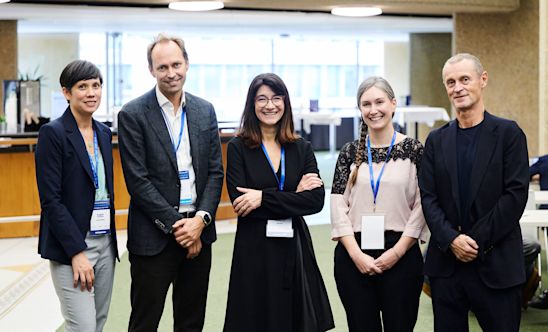EPND showcased at special symposium during 34th annual Alzheimer Europe conference
10/10/2024

At the recent Alzheimer Europe Conference in Geneva, the European Platform for Neurodegenerative Diseases (EPND) was highlighted amongst key research initiatives addressing critical challenges for Alzheimer's disease and other neurodegenerative diseases. Read on to learn more!
Elisabetta Vaudano, Principal Scientific Manager at the Innovative Health Initiative (IHI), emphasised the unique framework provided by public-private partnerships. These initiatives unite stakeholders from science and society including academia, industry, and patient organisations, ensuring that research outcomes address the needs of affected populations. IMI projects employ a participatory model where individuals with lived experience of different health conditions contribute to research design and implementation, improving the applicability of findings.Vaudano also highlighted how IMI projects build on each other’s advances. This interconnectivity fosters the continuous development of innovative methodologies, tools, and platforms that amplify the collective impact of individual research efforts.
EPND: a collaborative platform for discovery, sharing and analysis
Our partner Claire Chevalier from the University of Geneva explained how EPND is addressing many of the systemic challenges that hamper data and sample sharing. By integrating metadata from over 80 research cohorts involving 250,000 participants, EPND mitigates issues related to data silos, regulatory compliance, and accessibility. "EPND's infrastructure is facilitating data discovery and harmonisation," Claire stated, "helping to streamline research processes across Alzheimer’s disease, Parkinson’s disease, and other neurodegenerative conditions." The platform aims to standardise metadata formats and promote interoperability, enabling researchers to perform cross-study analyses with high-quality datasets and biosamples. These efforts will accelerate biomarker discovery and validation, critical steps toward the development of targeted diagnostics and therapeutics.
Providing support for Multidisciplinary Initiatives
EPND serves as a foundational data platform for other cutting-edge projects. One such initiative, AD-RIDDLE, focuses on early intervention and personalised care pathways for Alzheimer’s disease. Presented by Francesca Mangialasche from Karolinska Institutet, AD-RIDDLE employs a modular approach to integrate new advanced technologies for detection diagnosis, together with pharmacological and lifestyle interventions to treat Alzheimer's disease. By leveraging EPND's infrastructure, tools and resources, AD-RIDDLE aims to refine methods for early detection and risk reduction, ensuring that interventions are evidence-based and tailored to individual patient profiles.
Sister initiatives driving innovation in AI and Digital Health
Dag Aarsland from Stavanger University detailed the PREDICTOM platform, which is developing artificial intelligence-baed tools to screen for dementia risk in non-clinical settings. PREDICTOM combines cognitive assessments, eye-tracking data, and physiological biomarkers to identify individuals at risk. This AI-driven approach is designed to improve accessibility to early diagnostics, potentially enabling earlier intervention and improved disease management.
Linus Jonsson of Karolinska Institutet introduced PROMINENT, a digital platform that integrates real-world data, including electronic medical records, imaging, and wearable device outputs, to enhance clinical decision-making for patients with Alzheimer's disease. PROMINENT is developing a decision support system to provide clinicians with evidence-based recommendations for treatment strategies, supporting personalised healthcare planning.
Future Directions in Neurodegenerative Disease Research
These developments underscore the importance of large-scale collaboration and standardised data systems in accelerating progress against complex diseases like Alzheimer’s disease and other dementias. By addressing systemic challenges and integrating multidisciplinary approaches, platforms like EPND are facilitating the translation of scientific discoveries into clinical applications.